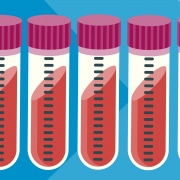Personalised medicine in the NHS: what will it mean?
Moving away from trial and error treatments to patient care tailored to your unique genetic makeup
Personalised medicine is increasingly spoken of, but what does it really mean? NHS England defines it as ‘a move away from a ‘one size fits all’ approach to the treatment and care of patients with a particular condition, to one which uses new approaches to better manage patients’ health and target therapies to achieve the best outcomes in the management of a patient’s disease or predisposition to disease’.
There is growing recognition of the value of person-centred care across the NHS, but personalised medicine is also driven by new scientific understanding and opportunities, as outlined in the latest report from NHS England, Improving Outcomes Through Personalised Medicine. Plans to keep Britain at the forefront of the personalised medicine revolution, first announced a year ago, are for a healthcare system that can, with increasing accuracy:
- predict and prevent disease
- precisely diagnose disease
- offer increasingly personalised treatments
- embrace a more participatory role for patients in their care
Building on genomic foundations
This is no pie in the sky, either; genomics is informing understanding how diseases arise and progress, which in turn helps clinicians choose the best treatment for each patient, and researchers to develop new therapeutics. We now understand that cancers once thought similar can in fact differ markedly in their genetic make-up, differences that can dictate the prognosis of the disease and responsiveness to treatments. Fundamental changes in our conception of other diseases are also gathering momentum, as evidence mounts that any complex disease is in reality an umbrella for a collection of disease sub-types, each with different origins and requiring different management.
In the future, personalised medicine will gather together a mass of biological, clinical and lifestyle information to present health professionals with a unique picture for each patient. Provided computing and informatics capacity can keep pace with this data deluge, analytics should be able to help interpret the status of each patient and suggest the most appropriate ways to help them. Accordingly, the new NHSE strategy emphasises the paramount importance of integrated, inter-operable electronic health records and data across the NHS.
The pillars of personalised medicine in the NHS
It is no surprise that the 100,000 Genomes Project and associated Genomic Medicine Centres are an essential element in developing both the genomics and informatics infrastructure needed to embed personalised medicine in the health service, as is the work of NHS Digital and the ‘Paperless2020’ programme. Other crucial contributions are the ongoing reconfiguration of the specialist genetic and molecular pathology laboratory services, and Health Education England’s own efforts to equip the NHS workforce in genomics and related skills that will enable them to deliver personalised care.
Next steps for NHS England and partners will be to engage with all stakeholders in developing a wider vision for personalised medicine, as well as building the commissioning frameworks and informatics systems that will be needed to deliver it, and learning from the Genomic Medicine Centres, Academic Health Science Networks and other programmes in order to address vital issues of ethics, equity and, of course, economics. Small exemplar projects will pioneer hands-on personalised medicine in selected clinical priority areas. All in all, this is quite a challenge – but the potential rewards in terms of better patient care and outcomes justify the effort.
To learn more about personalised medicine, you can view the latest Health and Care Innovation Expo 2016 videos from NHS England here.
–









